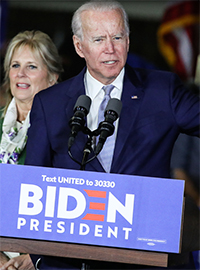| As in 1944, Democratic Running Mate Selection Seems Pivotal |
 |
|
By Victor Davis Hanson
Thursday, April 30 2020 |
Few Americans can remember past vice presidents such as Charles Curtis, Charles Dawes or Thomas Marshall. In more recent memory, almost no one can recall vice presidential nominees who lost such as William Miller, Sargent Shriver or Lloyd Bentsen. John Nance Garner served as Franklin D. Roosevelt's vice president for two terms (1933-1941), but he nonetheless described his eight years as "not worth a bucket of warm spit." Except "spit" was a euphemism used in place of Garner's profane slang for urine. Garner was edged out of the job when leftist Henry Wallace replaced him. But later, as World War II raged in July 1944, the frail Roosevelt was visibly suffering from a host of ailments during his third term. Rumors swept Washington that FDR was increasingly unable to meet the demands of the presidency. After all, Roosevelt was 62, a paraplegic, smoker and social drinker who suffered from congestive heart failure. For nearly 12 years he had already endured the most stressful presidency in history, guiding the country through both the Great Depression and World War II. Still, Democrats were convinced that FDR was their only hope in November 1944. Party bosses were confident that he could win an unprecedented fourth term over staid Republican nominee Thomas Dewey. As a result, the Democratic vice presidential nominee that year was thought likely to be the next president – and far sooner than later. Vice President Wallace had strong socialist sympathies. Southern Democrats and moderates were terrified that if Wallace remained in office, he would frighten away enough voters to ensure Roosevelt's defeat. Or, worse still, Wallace might become America's first de facto socialist president – right when Americans were starting to fear their wartime communist ally the Soviet Union. Wallace had hard fought to stay on the ticket. But his inner-party opponents pushed even harder for more moderate Missouri Sen. Harry Truman to take his place. Truman finally beat out Wallace at the July convention and was nominated vice president. Roosevelt, as expected, won the presidential election for a fourth time. But, as feared, he died less than three months into his new term. The relatively unknown Truman became an unlikely president. Yet Truman surprised the country with nearly eight years of responsible leadership. He finished the war, dropping the world's first two atomic bombs to defeat Japan without an invasion, and then faced down the Soviet Union to launch the Cold War. A President Wallace might have done things quite differently – or far worse. The Democratic Party is facing some of the same melodramas over the nomination of its vice presidential candidate for 2020. As in 1944, the United States is facing an ongoing existential crisis, as the coronavirus threatens to kill thousands more Americans and do trillions of dollars more damage to the economy. In such an ordeal, the Democrats believe that their likely nominee, Joe Biden, can win the November election. As with FDR in 1944, the 77-year-old Biden seems frail at times. He also seems frequently confused. There is concern in some corners that if elected, he might not be able to fulfill his duties. That unspoken fear has turned the selection of a Democratic running mate into a drama not seen in decades. Like Roosevelt, Biden is seen as a coalition builder, and not as left-wing as most of the failed Democratic primary candidates. Disheartened Bernie Sanders supporters are pushing for a progressive running mate. But the party establishment feels that Democrats already dodged the socialist bullet when Sanders' campaign finally collapsed. To placate radical Democrats, Biden has promised that his running mate will be either a minority, a woman or both – and likely far more left-wing than he is. Moderates are worried that Biden has already moved hard left, and if he goes even further with a progressive vice presidential pick, the Democratic ticket may well lose to Donald Trump. Privately, they would probably prefer as either their presidential or vice presidential nominee a known commodity such as New York Gov. Andrew Cuomo. The idea of a far-left politician such as former Georgia gubernatorial candidate Stacey Abrams as a potential president in the midst of the coronavirus panic might terrify some establishment Democrats, and perhaps many Americans as well. Just as it was 76 years ago, when the presidential nominee's health was failing and Henry Wallace was maneuvered off the ticket, we may well see a fight to ensure that a radical candidate is not selected as a Democratic running mate. This year, as in 1944, the VP job seems something more than a bucket of warm spit. Victor Davis Hanson is a classicist and historian at the Hoover Institution, Stanford University, and the author of "The Second World Wars: How the First Global Conflict Was Fought and Won," from Basic Books. You can reach him by e-mailing authorvdh[at]gmail.com.
(C) 2020 TRIBUNE CONTENT AGENCY, LLC. |
Related Articles : |
























